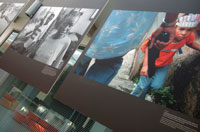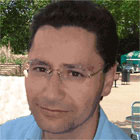Kingston academic calls for sweeping changes to the Genocide Convention
16/12/08
Kingston academic calls for sweeping changes to the Genocide Convention
 The United Nations is powerless to prevent and punish genocide, according to a Kingston University academic. Speaking on the 60th anniversary of the Genocide Convention, Visiting Professor Brian Brivati said the convention simply does not work and called for dramatic changes which would stop bloodshed in its tracks.
The United Nations is powerless to prevent and punish genocide, according to a Kingston University academic. Speaking on the 60th anniversary of the Genocide Convention, Visiting Professor Brian Brivati said the convention simply does not work and called for dramatic changes which would stop bloodshed in its tracks.
"Genocide has been happening in Darfur since 2004, in the full glare of the media, and the convention has done nothing to stop it," Professor Brivati said. "In 60 years, this convention has not prevented a single act of genocide. In effect, all it does is lead to injunctions issued against individuals, which are useless at stopping it."
His speech was the centrepiece of Kingston University’s Human Rights Festival, an annual event aimed at boosting awareness of genocide among staff, students and the general public. Professor Brivati called for all countries to be given a threshold of violence which, if crossed, would result in severe consequences and see them labelled as a genocidal regime. By doing so, action could be taken against the country, rather than individuals, he said. This would make the Convention capable not only of authorising the trial and conviction of perpetrators but would also help to stop genocide when it is starting.
"Those who step over this line should have their overseas assets frozen, their diplomats should lose immunity and their embassies should no longer be protected. They should lose membership of international organisations, play no part in international agreements and treaties, and have no legal status in international law," he added. "It would mark a new generation of human rights – victims’ rights."
 Professor Brivati, who is also director of charity the John Smith Memorial Trust, also called for the UN to have the same obligation to come to the aid of victims of genocide as it does to help countries invaded by other states. "Genocide is so serious that it is placed in a separate legal category from other crimes against humanity, and yet there is no legal requirement to take action to prevent it," he said. "We need urgent reforms to make genocide comparable to the invasion of another state because in essence that is what it is. The genocidal regime has invaded its own territory by declaring war against its own people, who need to be defended from the regime which is attacking them."
Professor Brivati, who is also director of charity the John Smith Memorial Trust, also called for the UN to have the same obligation to come to the aid of victims of genocide as it does to help countries invaded by other states. "Genocide is so serious that it is placed in a separate legal category from other crimes against humanity, and yet there is no legal requirement to take action to prevent it," he said. "We need urgent reforms to make genocide comparable to the invasion of another state because in essence that is what it is. The genocidal regime has invaded its own territory by declaring war against its own people, who need to be defended from the regime which is attacking them."
Human Rights Festival organiser Philip Spencer, from Kingston University’s Helen Bamber Centre for the Study of Mass Violence, said the speech had led to an interesting discussion on how to try and reduce violence against ethnic groups in the world. "This is the third year we have held this Human Rights Festival, attracting leading thinkers and policy-makers," he said. "It is only by bringing these issues to people’s attention and increasing the level of awareness of these activities that pressure can be maintained on the international community to combat genocide whenever it occurs."